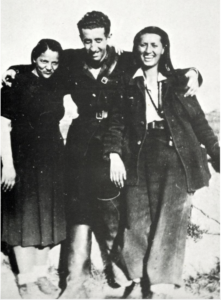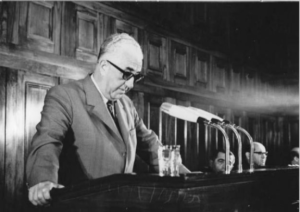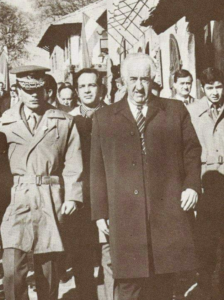
A Suspicious Crash
It was pretty much a requirement that politicians of a certain age in Yugoslavia have served as Partizans during World War II, and Džemal Bijedić was no exception to that rule.

Raised by Muslim parents in Mostar, Bosnia and Herzegovina, by 1939 Bijedić had joined the League of Communists. He was arrested at least four times for communist activities and joined the Partizans in February 1943.
Bijedić’s service was shrouded in some mystery – although it was never talked about at the time, photos where he was wearing NDH insignia later surfaced, along with the story that Bijedić had been ordered to infiltrate the organization by the League of Communists under the name “Ante Jukić”.
Very little is known about this episode in Bijedić’s life other than the unconfirmed whispers, but he did serve in an intelligence capacity as a Partizan. At the end of the war he was a major in OZNA (The Department For the Protection of the People), Yugoslavia’s early security agency.
Bijedić would go on to a life in Yugoslav politics, known as a an integrating force and very popular with everyday people for his habit of going out and questioning average citizens about the impact of various government policies.

From 1967 to 1971 he served as President of the Socialist Republic of Bosnia and Herzegovina Assembly, contributing greatly in modernizing the infrastructure and bringing about needed economic reforms.

In 1971 Bijedić became Prime Minister of Yugoslavia, and behind the scenes was seen as being prepared for a role as Tito’s successor. He continued his modernizing influence, creating trade relationships with Kuwait, Algeria, Egypt, Libya, Turkey, and Iran. Relations with Libya, in particular, were quite warm. A deal to produce Mirage-type aircraft for Libya was entered into, as well as supplying other military hardware and arms. This proved lucrative for the Yugoslav government.

But Bijedić was involved in more than infrastructure and economic deals. He was a driving force behind the official recognition of “Muslim” as a nationality within Yugoslavia in 1971.
When news of the 18 January 1977 plane crash that killed Džemal Bijedić and his wife Razija broke, there were nearly immediate whispers that the crash was not an accident. Those whispers have not abated in the forty years since, with Bijedić’s nephew Bahrudin claiming that Džemal Bijedić had warned him of coming trouble three months before his death.
Officially, the crash into Inač Mountain near Kreševo was caused by bad weather, but there is some evidence that the altimeter and speedometer had been tampered with. Initial investigation paperwork has been lost, but more recent investigations have produced contradictory findings.
If Džemal Bijedić was murdered, he would not have been the first to possibly suffer unconfirmed assassination by airplane. An astonishing number of public leaders have fallen victim to death in the skies, probably because it is nearly impossible to prove whether foul play was involved or merely bad luck.
To read more about the history of Tito’s Yugoslavia, click here. More information on World War II can be found here.
- January 18, 2021
- History , Interesting
